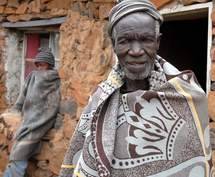|
Pensions
Key to Meeting
MD
G Targets
HelpAge
International
World
July 9, 2007

A monthly pension of US$27 makes a big difference for Molefi Lpelehi and his family. Photo: Leila
Amanpour/HelpAge International
A universal social pension worth US$1 a day can help developing countries meet Millennium Development Goal (MDG) targets, says HelpAge International on the MDG’s midway point to 2015.
The social pension is a core element of an enhanced and integrated social protection system. It is increasingly recognised by governments and international organisations as important to reduce poverty and enhance development.
Four of the five countries in southern Africa that have social pension schemes – Botswana, Lesotho, Mauritius and South Africa – are making more progress than their neighbours towards achieving MDGs on poverty and hunger, primary school completion and gender equality in primary education.
Reducing household poverty
Social pensions, even at low levels, benefit whole families and communities. Pensions contribute to economic growth, social stability and reduce the vulnerability of older people and their families. Pension income often finances investment in small-scale business.
Children benefit especially. Despite being one of the poorest countries in the world, Lesotho is now on track to halve poverty by 2015. 65% of pensioner income is spent on children and grandchildren. There has been a 20% increase in improved nutrition in pensioner households. In Mauritius households with older people and children would be 24% poorer without the social pension.
International Labour Organization projections for Tanzania show that a combination of a universal social pension and child benefit would reduce the poverty of households with children and older people by nearly one half.
Pensions are affordable. The World Economic and Social Survey 2007: Development in an Ageing World, published on 21 June, points out that providing a basic universal pension to all over 60s equivalent to US$1 a day would cost less than 1% of GDP in 66 out of 100 developing countries.
“The pension has made a big impact on our lives”
Molefi Lpelehi, 72, from Lesotho, lives with his disabled wife and two teenage grandchildren and has been receiving a non-contributory pension for the last two years. The pension of approximately US$27 per month was made universal in 2004.
“When I first received my pension I started to save money so that I could make some home improvements. I also have to put some money aside to take my wife to the clinic in a town 20km away. She suffered a stroke a few years ago and is now disabled and needs medication.
“The pension has made a big impact in our lives. If I didn’t receive the pension any more life would be very difficult again. I now dream of having savings and building another house in the future to leave for my family.”
Enhanced social security for all
The MDGs commit the world to halving extreme poverty by 2015. We should judge their success rate by seeing how the very poorest, including older people, ethnic minorities, people with disabilities and the very young, are faring.
The World Economic and Social Survey 2007 recognised that old-age poverty tends to be high in countries without a comprehensive formal pension system.
In developed countries old-age pensions and other cash transfers have been a powerful instrument to reduce poverty across the life course, with estimates that poverty in OECD countries would be 50% higher without them.
As well as supporting children, pensions play a key role in old-age support systems. As longevity increases throughout the world more women and men are growing old in poverty.
Evidence from countries with such systems in southern Africa shows that the social pension is the bedrock for enhanced social security for all.
Social pensions support the realisation of the universal right to social security and an adequate standard of
living. They also make important contributions to older people’s empowerment and ability to claim other rights for themselves and their dependants.
More
Information on World Pension Issues
More Information on Social
Pension Issues
More
Information on Trade Unions and World Pension Issues
Copyright © Global Action on Aging
Terms of Use |
Privacy Policy | Contact
Us
|



